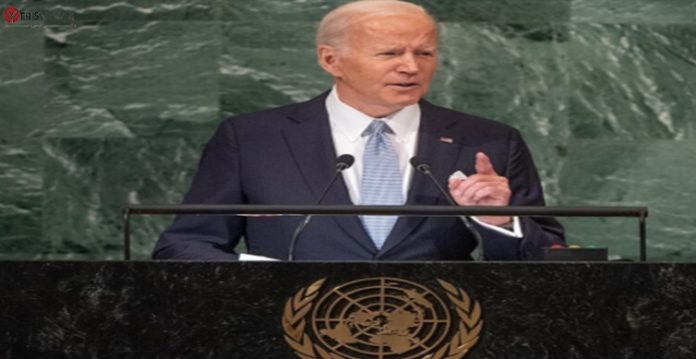US President Joe Biden has acknowledged that there are “shifting geopolitical trends” in relation to China, but said that the US does not seek conflict or want another cold war.
Speaking at the UN General Assembly’s high-level meeting on Wednesday, he said, “Let me be direct about the competition between the United States and China. As we manage shifting geopolitical trends, the United States will conduct itself as a reasonable leader.”
“We do not seek conflict. We do not seek a Cold War. We do not ask any nation to choose between the United States or any other partner”, he said.
But the US will “be unabashed in promoting our vision of a free, open, secure, and prosperous world,” he added.
With tensions rising between Beijing and Taipei, especially after US Speaker Nancy Pelosi’s visit to the island in August, Biden said, “We seek to uphold peace and stability across the Taiwan Straits.”
He reiterated Washington’s commitment to “‘One China’ policy, which has helped prevent conflict for four decades. And we continue to oppose unilateral changes in the status quo by either side”.
He also criticised Beijing’s nuke programme, saying “China is conducting an unprecedented, concerning nuclear buildup without any transparency”.
He said that Washington was engaged in “new, constructive ways to work with partners to advance shared interests” and was “elevating” the Quad – a group of India, the US, Australia and Japan in the Indo-Pacific”.
In a dig at Beijing’s programmes such as the “One Belt, One Road” initiative and others for infrastructure programmes that have led to serious economic problems for countries like Sri Lanka, Biden tried to contrast them with Washington’s.
ALSO READ: Al Qaeda Terrorists Evicted from Yemen Province
He said that the US offers countries “investments that are designed not to foster dependency, but to alleviate burdens and help nations become self-sufficient; partnerships not to create political obligation, but because we know our own success – each of our success is increased when other nations succeed as well”.
“With partners in the Americas, Africa, Europe, and the Middle East, and the Indo-Pacific, we’re working to build a new economic ecosystem while – where every nation – every nation gets a fair shot and economic growth is resilient, sustainable, and shared.
Iran President Seyyed Ebrahim Raisi, who spoke before Biden, said Teheran was ready to return to the nuclear deal it had entered into with the five permanent members of the Security Council, Germany and the European Union aimed at preventing it from developing nuclear weapons.
The US had unilaterally repudiated it during Donald Trump’s presidency freeing Iran from its obligations under the agreement known as the Joint Comprehensive Plan of Action (JCPOA).
But Iran continues to face crippling sanctions from the US and the West.
Raisi said that there is a “serious will” to accept a new nuclear deal but said that there should be a commitment that it will not be repudiated again.
Biden said that the US was “prepared for a mutual return to the Joint Comprehensive Plan of Action if Iran steps up to its obligations”.
But, he declared, “the United States is clear: We will not allow Iran to acquire a nuclear weapon”.
(This story has been sourced from a third-party syndicated feed, agencies. Raavi Media accepts no responsibility or liability for the dependability, trustworthiness, reliability, and data of the text. Raavi Media managementythisnews.com reserves the sole right to alter, delete or remove (without notice) the content at its absolute discretion for any reason whatsoever.)


